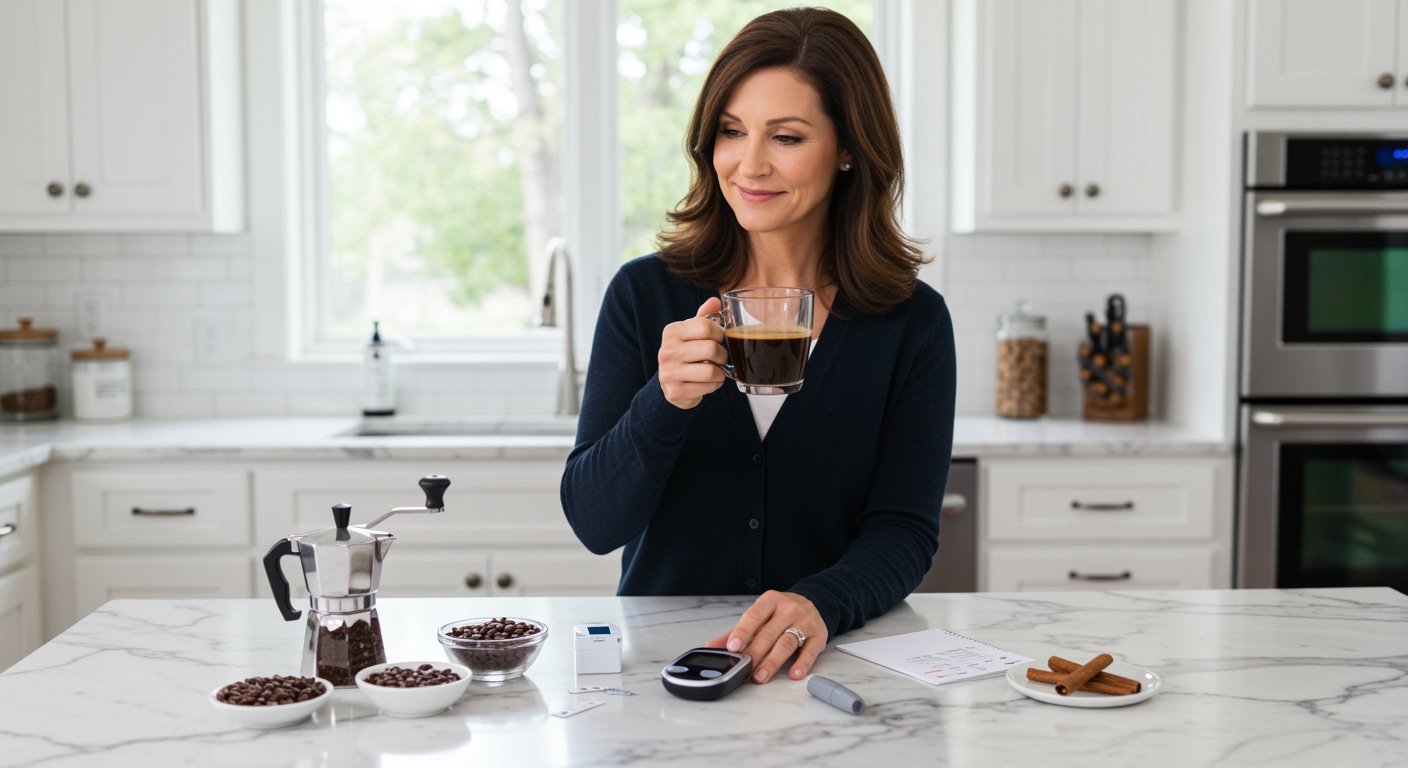✪ Key Takeaway: Coffee can be safe for diabetes when consumed black and in moderation, but added sugars and creamers make it dangerous.
Introduction
Your morning coffee ritual might be sabotaging your blood sugar without you knowing it.
You probably wonder if your daily cup affects your diabetes management or if you should give up this beloved habit completely.
Hi, I am Abdur, your nutrition coach and today I am going to explain exactly how coffee impacts diabetes and show you the safe way to enjoy it.
Does Coffee Raise Blood Sugar Levels?
Black coffee contains virtually zero carbohydrates and should not raise your blood sugar directly.
However, caffeine can trigger your body to release stress hormones like cortisol and adrenaline.
These hormones signal your liver to release stored glucose, which can cause a temporary blood sugar spike.
The response varies greatly between individuals, with some people experiencing no change while others see significant increases.
Research shows that regular coffee drinkers often develop tolerance to these effects over time.
Your genetics, stress levels, sleep quality, and overall health status all influence how your body responds to caffeine.
✪ Pro Tip: Test your blood sugar before and after drinking coffee to understand your personal response pattern.
Can Coffee Actually Protect Against Diabetes?
Multiple large-scale studies reveal that regular coffee consumption may actually reduce your risk of developing type 2 diabetes.
Coffee contains powerful antioxidants called chlorogenic acids that help improve insulin sensitivity and glucose metabolism.
These compounds slow down glucose absorption in your intestines and reduce glucose production in your liver.
Research indicates that people who drink 3-4 cups of coffee daily have a 25% lower risk of developing type 2 diabetes compared to non-drinkers.
The protective effects appear stronger with filtered coffee rather than boiled or espresso preparations.
Interestingly, both caffeinated and decaffeinated coffee show similar protective benefits, suggesting that compounds other than caffeine provide the diabetes protection.
✪ Fact: Coffee contains over 1000 bioactive compounds that may contribute to its health benefits beyond just caffeine.
What Makes Coffee Dangerous For Diabetics?
The real danger lies not in the coffee itself but in what you add to it.
Sugar, flavored syrups, whipped cream, and high-fat creamers can turn your healthy black coffee into a blood sugar bomb.
A typical flavored coffee drink from popular chains can contain 30-50 grams of sugar, equivalent to eating 12-20 teaspoons of pure sugar.
These additions cause rapid blood glucose spikes that can be dangerous for people with diabetes.
Additionally, some people experience increased insulin resistance when they consume caffeine regularly, especially if they have poor sleep habits or high stress levels.
Timing also matters because drinking coffee on an empty stomach may cause more dramatic blood sugar fluctuations than having it with food.
✪ Note: Always read ingredient labels on coffee creamers as many contain hidden sugars and artificial additives.
How Should Diabetics Drink Coffee Safely?
Start with black coffee to eliminate any blood sugar impact from additives.
If you need to add flavor, use cinnamon, which may actually help improve insulin sensitivity and glucose control.
Limit your intake to 2-3 cups per day and avoid drinking coffee late in the day as poor sleep can worsen blood sugar control.
Consider having your coffee with a balanced meal that contains protein and healthy fats to minimize any potential blood sugar spikes.
Monitor your blood glucose levels before and after drinking coffee for several days to understand your individual response pattern.
If you must use cream, choose unsweetened options like heavy cream or unsweetened almond milk in small amounts.
Switch to decaffeinated coffee if you notice consistent blood sugar elevations after drinking regular coffee.
✪ Pro Tip: Gradually reduce added sugars and creamers over two weeks to retrain your taste buds to enjoy black coffee.
The Bottom Line
Coffee can be part of a healthy diabetes management plan when consumed wisely and in moderation.
Your health is worth more than convenience, so choose your coffee additions carefully and monitor your body’s response.
I would love to hear about your experience with coffee and diabetes management, so please share your questions or feedback in the comments below.
References
At NutritionCrown, we use quality and credible sources to ensure our content is accurate and trustworthy. Below are the sources referenced in creating this article:





